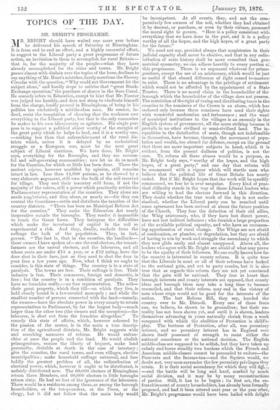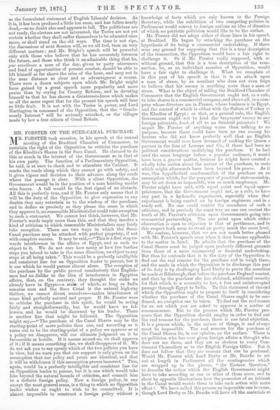TOPICS OF THE DAY.
MR. BRIGHT'S PROGIVAINE.
MR. BRIGHT should have waited one more year before he delivered his speech of Saturday at Birmingham. It is from end to end an effort, and a highly successful effort, to suggest to the Liberal party a great programme of future action, an invitation to them to accomplish for rural Britain— that is, for the majority of the people—what they have already accomplished for the cities and towns. Mr. Bright passes almost with disdain over the topics of the hour, declines to say anything of Mr. Hunt's mistakes, barely mentions the Slavery Circular with the 9trestion, "Why could not Government let the subject alone," and hardly stops to satirise that "great Stock- Exchange operation," the purchase of shares in the Suez Canal. He scarcely refers to Education, except to hint that Mr. Forster was judged too harshly, and does not stoop to vindicate himself from the charge, loudly pressed in Birmingham, of being in his politics too exclusively a middle-class man. He cannot, in- deed, resist the temptation of showing that the workmen owe everything to the Liberal party, but that is the only concession he makes to his own idiosyncrasy as agitator. His single pur- pose is to suggest a political object worthy of the energies of the great party which he helps to lead, and it is a worthy one, —nothing less than that enfranchisement of the rural dis- tricts which, unless it is delayed by an ecclesiatical struggle or a European war, must be the next great subject of Liberal exertions. We have done, Mr. Bright says, everything for the Boroughs, and they are success- ful and self-governing communities ; now let us do as much for the Counties, for which so little has been done. There the ancient re'ginte, however modified by opinion, still remains intact in law. Less than 14,000 persons, as he showed by a very elaborate argument, still own the bulk of the soil reserved for tillage. They and their tenantry still form, if not the majority of the voters, still a power which practically settles the Parliamentary representation of the counties. They alone are made magistrates, and they alone, or nearly so—for they can control the Guardians—settle and distribute the taxation of the country districts. "There has been no Municipal Reform Act for the counties." They make the Education Act nearly inoperative outside the boroughs. They render it impossible to touch the Game Laws. They interpose the difficulties which make the investment of capital in the soil so experimental a risk. And they, finally, exclude from the suffrage the bulk of the population. They, in fact, govern. "The fact is, that in the counties, the landlords— those owners I have spoken of—are the real electors, the tenant- farmers are the unreal electors, and the labourers, and all whose rents are under £15 a year, or a .£12 rating, have the door shut in their face, just as they used to shut the door in your face a few years ago. Now, what I think we ought to consider, is this state of things. The country is in a state of paralysis. The towns are free. Their suffrage is free. Their industry is free. Their commerce, foreign and domestic, is free ; but the country is in a condition of paralysis. They have no franchise really,—no free representation. The soil— their great property, which they till—on which they live, is held closely bound in a law-created monopoly ; and while the smallest number of persons connected with the land—namely, the owners—have the absolute power in every county to return representatives to Parliament, by far the largest body—much larger than the other two (the owners and the occupiers)—the labourer, is shut out from the franchise altogether." To remedy this state of affairs, which, however coloured by the passion of the orator, is in the main a true descrip- tion of the agricultural districts, Mr. Bright suggests wide and searching measures of reform. He would enfran- chise at once the people and the land. He would abolish primogeniture, restore the liberty of bequest, make land personalty, divisible at death in the' case of intestacy ; give the counties, the rural towns, and even villages, elective municipalities ; make household suffrage universal, and face boldly the greatest problem of all, the redistribution of electoral power, which, however it ought to be distributed, is unfairly distributed now. The 60,000 electors of Birmingham return three Members, and 60,000 electors in little boroughs return sixty. He had no fear of the ignorance of the labourers. There would be a residuum among them, as among the borough householders, or the ten-pounders, or the Peers, or the clergy, but it did not follow that the main body would
be inconipetent. At all events, they, and not the com- paratively few owners of the soil, whether they had obtained it by descent, or purchase, or even by their virtues, possessed the moral right to govern. " Here is a policy consistent with everything that we have done in the past, and it is a policy worthy of all the hopes, and the high hopes, of a great party for the future.'
We need not say, provided always that magistrates in their judicial capacity shall never be elective, and that in any redis- tribution of seats history shall be more consulted than geo- metrical symmetry, we can adhere heartily to every portion of this programme. There is no argument whatever for primo- geniture, except the use of an aristocracy, which would be just as useful if that absurd difference of right ceased to-morrow- to exist. There is no advantage in the privilege of settlement which would not be afforded by the appointment of a State- Trustee. There is no moral claim in the householder of the borough which the householder of the village does not possess. The restriction of the right of taxing and distributing taxes in the counties to the nominees of the Crown is an abuse, which has- endured only because those nominees have used their rights with wonderful moderation and forbearance ; and the want of municipal institutions in the villages is an anomaly in the- English system of government, all the more striking because it- prevails in no other civilised or semi-civilised land. The in- equalities in the distribution of seats, though not indefensible in themselves, have become, through the movement of popu- lation and wealth, too absurd for defence, except on the grounik that there are more important subjects in hand, which it is evident, from the present dullness of politics, is not the case. To.reform all these abuses would be a purpose, as- Mr. Bright truly says, "worthy of the hopes, and the high hopes, of a great party," and one day that reform will be commenced with a vigour which will startle men who. believe that the political life of Great Britain has nearly ended. But if Mr. Bright hopes that the work will be speedily commenced, we fear he is over sanguine. Every kind of prac- tical difficulty stands in the way of those Liberal leaders who. are willing to lead the electors forward in this direction. They doubt whether the true work of the day is not eccle- siastical, whether the Liberal party can be reunited until some agreement has been arrived at about the future position of the Church. They fear the defection of their old allies, the Whig aristocracy, who, if they have lost direct 'power,. have not lost indirect influence ; who furnish a large proportion of the available political capacity, and who have an unreason- ing apprehension of rural change. The Whigs are not afraid of confiscation, or plunder, or degradation, but they are afraid' of having to win by work and struggle the ascendancy to which they now glide easily and almost unopposed. Above all, the leaders who agree with Mr. Bright are afraid of what may prove to be the apathy of their followers. No one really knows how far the country is interested in county reform. It is quite true that the Liberals in most or all of their reforms have looked to the national gain, and not to party results, but it is also. - true that as regards this reform they are not yet convinced that the gain will be national. They fear at heart that borough interests and county interests are opposed, that county- ideas and borough ideas may take a long time to become. reconciled, and that their reform may end in the victory of men whose reign would not be good for the interests of the- nation. The last Reform Bill, they say, handed the country over to Mr. Disraeli. Every one of these fears- can, we believe, be shown to be groundless; but their un- reality has not been shown yet, and until it is shown, leaders themselves advancing in years naturally shrink from a work compared with which the abolition of Protection is child's- play. The buttress of Protection, after all, was pecuniary interest, and no pecuniary interest has in England ever shown itself possessed of strength to resist either the national conscience or the national decision. The English middle-class are supposed to be selfish, but they have taken up. calmly and borne steadily two burdens which the French and. American middle-classes cannot be persuaded to endure—the Poor-rate and the Income-tax—and the Squires would, we doubt not, very soon surrender the few pecuniary privileges they retain. It is their social ascendancy for which they will —and the battle will be long and hard, marked by much social division, and it may be by many reconstructions of parties. Still, it has to be begun ; its first act, the en- franchisement of county householders, has already been formally proposed, and had it been uttered next year or the year after, Mr. Bright's programme would have been hailed with delight as the formulated statement of English Liberals' decision. As it is, it has been produced a little too soon, and has fallen nearly dead,---as no doubt also seed appears to fall. The politicians are not ready, the electors are not interested, the Tories are not yet certain whether they shall suffer themselves to be educated once more, or shall stand on the old ways. The time is not ripe, the discussions of next Session will, as we all feel, turn on very different matters ; and Mr. Bright's speech will be powerful only with those who believe that he has accurately foreseen the future, and those who think it an admirable thing that he, par excellence a man of the day, given to party utterances and fond of opportunities of present combat, should be able to lift himself so far above the cries of the hour, and map out in the near distance so clear and so advantageous a course. There were a dozen subjects upon which Mr. Bright might have gained by a great speech more popularity and more praise than by crying for County Reform, and in devoting himself to that he has shown a disinterestedness which makes us all the more regret that for the present his speech will bear so little fruit. It is not with the Tories in power, and Lord Hartington in command of the Opposition, that the "Gentle- manly Interest" will be seriously attacked, or the villager made by law a free citizen of Great Britain.







































 Previous page
Previous page